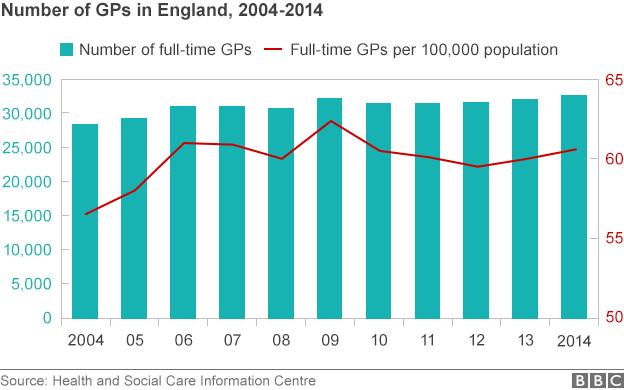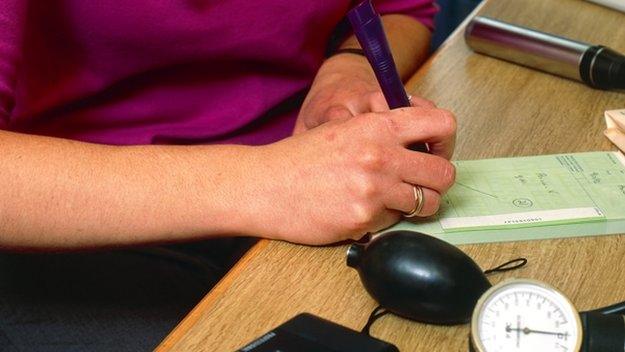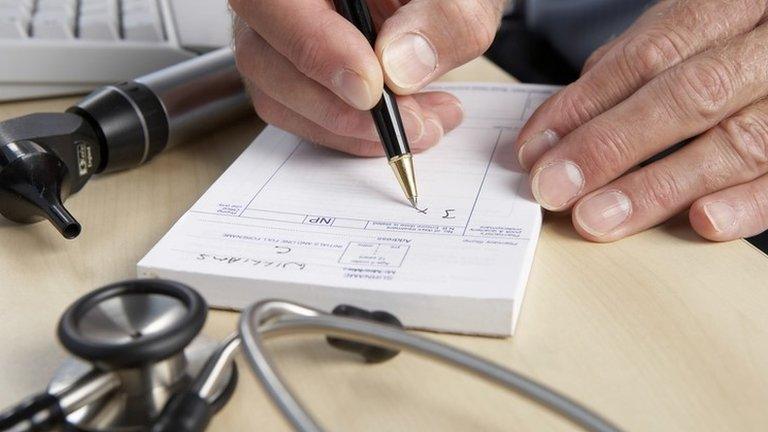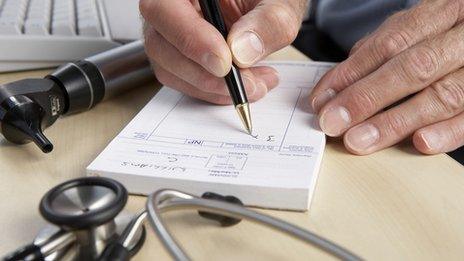NHS weekend: 7-day GP opening 'unachievable'
- Published
- comments
Dr Simon Sherwood: "Being a GP is an impossible job"
The goal of seven-day routine GP opening in England is unachievable in this Parliament and risks destabilising care, the Royal College of GPs says.
Ministers have promised that by 2020, people will have access to GPs seven days a week - and have pledged 5,000 extra doctors to help achieve that.
But RCGP president Maureen Baker said they would largely be needed to plug gaps in the current workforce.
The government said surgeries should work together to deliver the service.
There are no official figures for GP vacancy rates, but Dr Baker said evidence from its members suggested the vacancy rate could be more than 10%.
"We haven't the nurses and the support staff to do the hours we're already contracted to do, never mind extend those.
"Therefore, frankly, 08:00 to 20:00, seven days a week for routine general practice is unachievable."
Dr Baker said pushing ahead with the plans in the current climate could cause problems. "The danger is that in order to provide services over those extended hours, that you destabilise other parts of the service.

NHS weekend: Want to know more?
Visit the BBC's special report page on 7-day services (This link will not work on the BBC app but some of the key content can be seen below)

"You're fishing from the same pool, so if those doctors are attracted into that work, instead of out-of-hours service for instance, then there's a risk that you destabilise the out-of-hours service so that people can come and have routine care on a Sunday teatime."
The British Medical Association has also questioned the policy, saying investment should be concentrated on existing services.

Is there a GP problem?
In terms of numbers of GPs working in England, the picture is complex. Health and Social Care Information Centre data shows that, in 2009, there were 32,111 GPs once doctors in training and retainers, mainly retired GPs who do a few shifts, are excluded.
In 2014, that had risen by just over 500 to 32,628. A sign of improvement? Not quite. If the population rise is factored in, the number of GPs per 100,000 people dropped from 62.4 to 60.6.

Another way of looking at the issue is to consider waiting times. But again that is not so easy to gauge. Unlike hospital or A&E waiting, GP data is not tracked officially.
The best source of information is therefore the official GP survey carried out by Ipsos MORI for NHS England. On a number of key measures, including overall experience and ability to be seen, ratings have fallen.
Three-quarters of respondents said they were satisfied with their surgery's opening hours last year - a drop of 4.8 percentage points since December 2012.

'Absolutely focused'
Senior GP Sir Sam Etherington, who was appointed by the NHS to lead the work on redesigning primary care, said there was "a lot more that could be done"
He said this was achievable in the next five years with "more resources" and if technology - including GP appointments by telephone - was used "much more efficiently" in the NHS.
Dr Jim O'Donnell: "We need to stay with seven-day working"
Health Secretary Jeremy Hunt has said he is "absolutely focused" on making seven-day GP opening happen.
At the start of the summer, he reiterated the commitment made in the Conservative manifesto to recruit 5,000 extra GPs, while setting out what he said was a "new deal" for the profession.
It included promises to look at making it easier to return to the profession or work part-time as well as floating the idea of financial incentives to encourage doctors to work in areas where there were shortages. Talks with the British Medical Association are due to get under way later in the autumn.
Mr Hunt said: "We just have to recognise that it's not just about convenience, people don't just get ill Monday to Friday, they get ill every day of the week. Our health is the most important thing for each and every one of us."
A Department of Health spokeswoman said: "Patients want to be able to see a GP in the evening and at weekends.
"There are already 2,500 practices working towards this and they understand we're not asking individual GPs to work seven days a week - it's about surgeries working together to provide this service.
"This is backed up by our commitment to deliver an estimated 5000 more doctors in general practice by 2020."
- Published19 June 2015

- Published19 June 2015
- Published9 April 2015

- Published7 April 2015

- Published4 November 2014
- Published30 September 2014

- Published30 September 2014
- Published3 July 2014

- Published3 October 2013

- Published14 April 2014

- Published24 December 2013

- Published1 October 2013

- Published1 October 2013